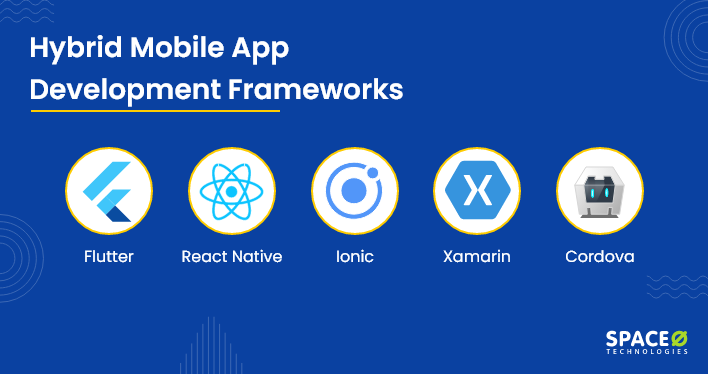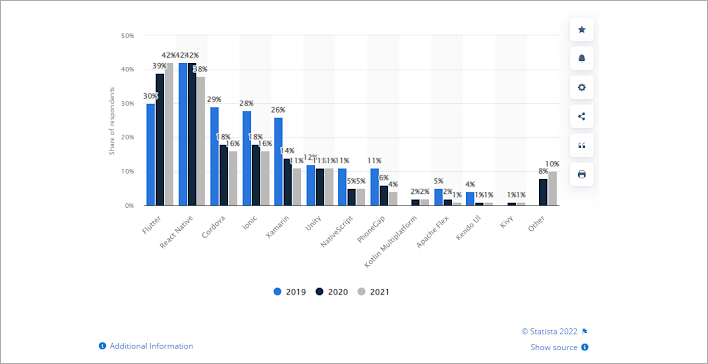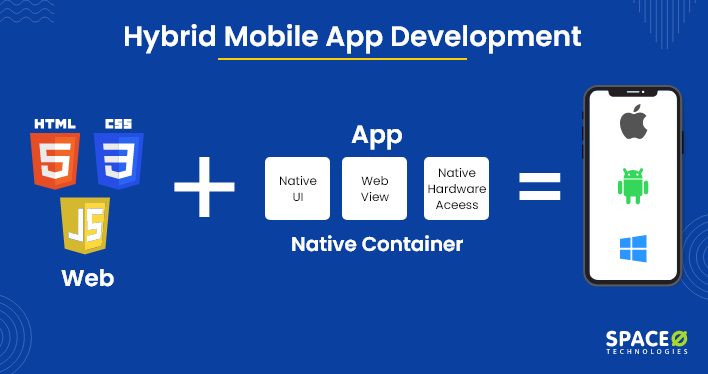Want to build a hybrid mobile app but not sure what it is exactly?
Looking for a complete guide that talks about hybrid mobile app development?
Check this blog, being a prominent mobile app development company, we have discussed important points about hybrid mobile app development, as well as how it hybrid app stands out and why it is in demand.
Through this guide, you will get to know:
- What is exactly a hybrid app?
- The core advantages and disadvantages of hybrid app
- Top hybrid app development frameworks
- Best examples of hybrid apps
If this sounds exciting, then get going to discover more about hybrid applications.
Table of Contents
What is a Hybrid Mobile App?
Hybrid applications are a blend of native apps and web app solutions. The core of the hybrid app is written in JavaScript, HTML, and CSS, and then it is encapsulated in a native app. This is how a hybrid app is born.
Let’s quickly understand what is a native and web app to understand more about the hybrid app.
| Native App | Web App |
|---|---|
| A software program that is built for a specific platform, such as either iOS or Android, falls under native mobile apps. | A web app that runs in a web browser and is delivered on the World Wide Web to users with an active internet connection. |
Therefore, a hybrid app is essentially a web app but has certain native platform features, such as the device’s camera, calendar, GPS, and push notifications. In addition, with the use of plugins, a hybrid app gets access to the mobile device’s features.
A hybrid app is simply found on the app stores and can be installed on your mobile devices to access it, just like a native app. Also, know more about native app vs hybrid app to understand the in-depth difference.
| Feature | Native App | Hybrid App | Web App |
|---|---|---|---|
| Device Access | Full | Limited | Full (but with plugins) |
| Performance | High | Medium to High | Medium to High |
| Development Language | Swift, Objective-C, Java, Kotlin | HTML, CSS, JavaScript | HTML, CSS, JavaScript |
| Cross-platform Support | No | Yes | Yes |
| User Experience | High | Medium to High | Medium to High |
| Code Reusability | No | Yes | Yes |
Now you know what exactly a hybrid app is, so let’s explore why it is beneficial to build a hybrid app. In the next section, we are going to discuss the pros of a hybrid app. Let’s dive in.
Want to Build a Hybrid App?
Talk to us. Space-O is a leading hybrid app development company in the USA have experience in building more than 4400 mobile apps using the latest technologies.

What are the Advantages of Hybrid Mobile Apps?
There are many global players like Amazon, Walmart, and Nike that are already using a hybrid app development model over native app development. You would have realised that there are multiple advantages of mobile apps for businesses.
One reason why you should opt for hybrid app development is, that the cost of app development is lower in comparison to native apps. As hybrid apps take less time to build and there is only one codebase to manage. But what more? Let’s discuss all those benefits in this section.
Single Codebase to Manage
With hybrid, you are required to create only one app that is compatible with all the major operating systems.
Therefore, hybrid mobile app developers create only one codebase across both Android and iOS devices, unlike native, where you are required to create 2 separate apps for iOS and Android.
Easy to Scale on Another Platform
As hybrid apps are built using a single codebase and other hybrid app technologies such as cloud-native technologies, it is easy to deploy apps across various devices.
Also, you can easily hire dedicated developers and build an app that can be launched on iOS as well as Android and enhance scalability.
Offline Availability
Because of the native infrastructure, hybrid apps work in an offline mode. Even if it is difficult to access the real-time data, users can easily load the application to check the previously loaded data.
Even though a hybrid app comes with a lot of benefits, there are still some disadvantages to it. So let’s discuss those disadvantages for better clarification.
What are the Disadvantages of Hybrid Apps?
If you are planning to build a hybrid app, you need to know that there are several challenges associated with hybrid applications. But what are they? Let’s find out.
Lower App Performance
As the hybrid app load in a WebView, it is difficult to offer strong native performance for the hybrid app. Therefore, it is one of the most significant drawbacks of having a hybrid app.
Poor UI/UX
When it comes to designing a hybrid app, it is very challenging for the developers to ensure that UI delivers a consistent UX across different app devices. It is really challenging for developers to customize an app based on different operating systems. Also, poor internet connectivity leads to inconsistent UX sometimes. Therefore, to avoid such inconsistencies in design understand which is a good app design practice.
App Testing Complexities
Building a hybrid app might come with unexpected hidden errors. In addition, as a hybrid app shares a lot of code between various mobile platforms, this adds a lot of complexity to your project.
When you get a question like how to make a hybrid app? The process starts with finding a suitable hybrid app development framework. Check the following hybrid mobile app frameworks to develop powerful mobile apps.
5 Best Hybrid Mobile App Development Frameworks

According to a report by Statista, these are the top cross-platform frameworks used by developers worldwide.

Source: Statista
As the demand for hybrid apps is rising, these frameworks have emerged to meet the needs of the developers. Prior to utilizing these frameworks, make sure you understand how to create an app.
After receiving your answer, understand these cross-platform app development frameworks in detail. But before that, we will quickly compare all these frameworks for an easy bifurcation.
| Framework | Developer | Initial Release | Written In | Popular Apps |
|---|---|---|---|---|
| Flutter | 2017 |
|
| |
| React Native | 2015 |
|
| |
| Cordova | Nitobi | 2009 |
|
|
| Ionic | Drifty | 2013 |
|
|
| Xamarin | Microsoft | 2011 |
|
|
Now let’s discuss all these mobile app development frameworks in detail, along with their key advantages.
Flutter
Flutter is a hybrid app development framework that uses Dart programming language. It is used to build natively compiled, multi-platform apps for Android, iOS, Linux, and Windows with a single codebase.
Benefits of Flutter
- Support hot reload feature to help you in fast code writing
- Features rich widgets that can be customized according to the needs
- Has ready-to-use widgets to easily create interactive UI elements
React Native
Is React Native good for mobile app development? To answer your question, React Native provides native modules. Therefore, it is the best hybrid app framework of choice for developers to build hybrid apps.
Developed by Facebook, this hybrid mobile app framework is used in front-end technology stacks. Additionally, React Native allows you to convert the source code into native elements to give you the best native experience out of a hybrid app.
Benefits of React Native
- Offers strong native-like performance
- Intuitive modular architecture for easy and quick updates
- Easy to use the same code across iOS and Android operating systems
Cordova
With Cordova, you use standard web technologies such as HTML5, CSS3, and JavaScript to build hybrid apps.
You can easily run a single-page application (SPA) within an integrated mobile web browser that is basically a WebView. With the help of plugins, you get access to native features when needed.
Benefits of Cordova
- Comes with several libraries and frameworks, which can be optimized accordingly
- Save on app development time as it allows faster time-to-market
- No need to learn platform-specific programming languages
Ionic
It is one of the most popular frameworks that use the traditional WebView approach. This means the web-based source code is encapsulated in a WebView that is further interfaced with native APIs via plugins.
Also, Ionic offers a lot of tools and features to build hybrid apps, including native UI components and layouts, debugging, and testing tools.
Benefits of Ionic
- Allows you to write code once and run that code everywhere
- Enables you to integrate high-end configurable plugins
- Has an easy and convenient hybrid app testing process
Xamarin
Xamarian is one of the best hybrid mobile app development tools, it allows for building universal applications that you run on various platforms without compromising native design or sacrificing code reusability.
With Xamarin, you write your hybrid mobile apps in C# and get the benefit of the .NET development ecosystem.
Benefits of Xamarin
- Has complete package of mobile app development toolset
- Get easy updates, testing, and maintenance
- Supports IoT, TVs, and wearables and offers various testing tools
5 Top Examples of Hybrid App
With the advancement in web technologies and frameworks, even some of the giant companies are building hybrid apps. Here we have discussed a few hybrid app examples for your perusal.
| Hybrid App Example | Explanation |
|---|---|
| Gmail | It uses the front-end technologies, such as JavaScript, AJAX, jQuery, and Vue.js, making it one of the most popular hybrid apps. |
| It uses front-end technologies like Node.js, Express, and React Native. Twitter is one of the progressive web apps that delivers the best UI performance so that users go through the content even when the internet connectivity is poor. | |
| It is built using React Native technology, and its timeline is a WebView. Therefore, it is called a hybrid app. | |
| Uber | To offer WebView to the app users, Uber uses Base, a web React UI framework for the front-end. It helps run the app on m.uber.com seamlessly. |
| Untappd | It uses Ruby on Rails and other web technologies to fall under the category of hybrid apps. In fact, Untappd also uses React Native for cross-platform compatibility. |
Still, have some doubts? Then read the following section, which shares the most asked questions along with their answers. Get to know more about hybrid mobile app development.
Have a Custom Hybrid App Development Idea?
Contact us to discuss your unique app idea. Our tech professional will validate your app idea and help you devise a custom strategy.
FAQ About Hybrid App Development
How is a hybrid app built?
As you know, a hybrid app is the right blend of native and web development.
First, the hybrid app is written using web technologies like HTML, CSS, and JavaScript. Then the app is encapsulated into a container called a WebView and wrapped within a native app using open-source frameworks, such as React Native and Ionic. In short, a hybrid app is built using web technologies but offers native platform features.
How much time does it take to build a hybrid app?
Generally, it takes 2 – 6 months to build a full-fledged hybrid application. This range depends on several factors, such as the app’s complexity, features, and functionalities you are integrating into your app, the usage of the third-party API services, the UX/UI design, and the tech stacks you will use. To know the exact hybrid app development timeline, book our app development consulting service.
Build Your Own Hybrid App
Through this guide, you get to know almost all the essential information about hybrid app development. Now, it would be easy for you to build a hybrid app with the right tech stack as we have discussed many hybrid app frameworks along with their key advantages.
If you are now ready to build a hybrid app, get in touch with us to discuss your custom requirements as we are a top hybrid mobile app development company. Once you contact us, our professional tech consultant will validate your app idea and provide complete hybrid mobile app development services to build a powerful hybrid app.



